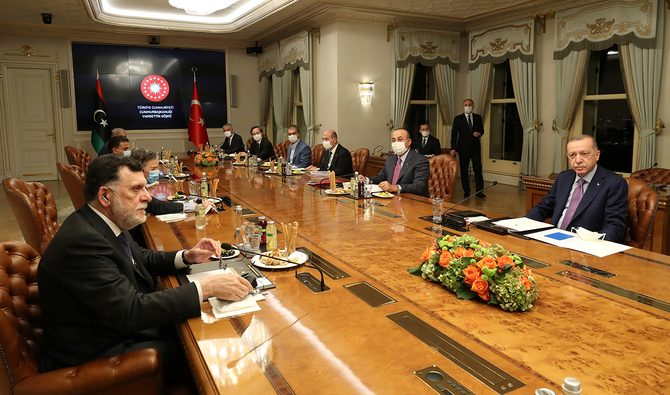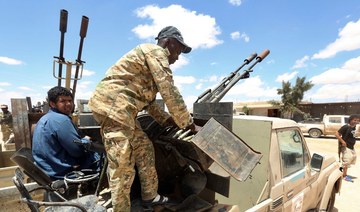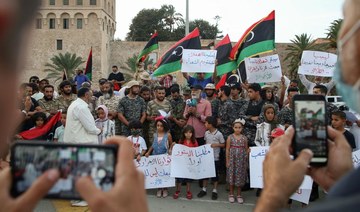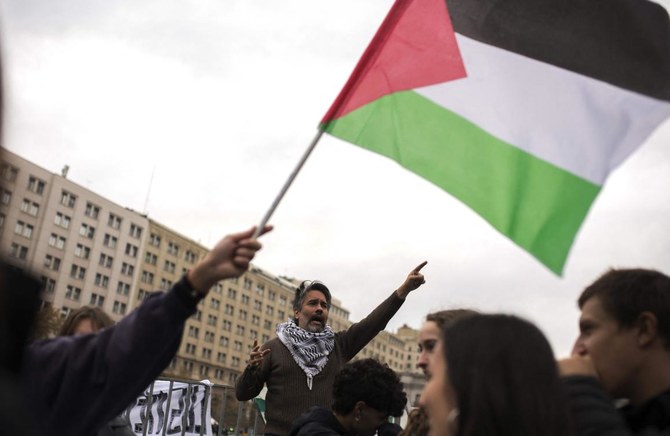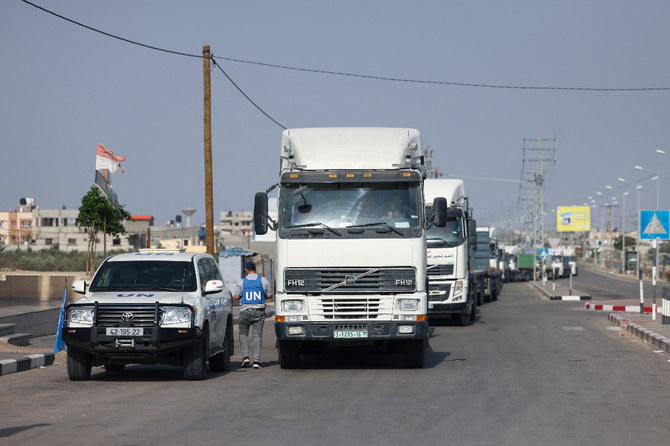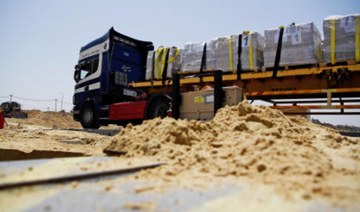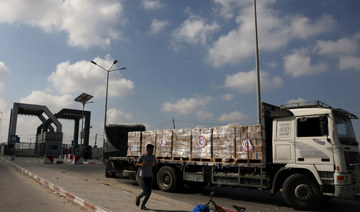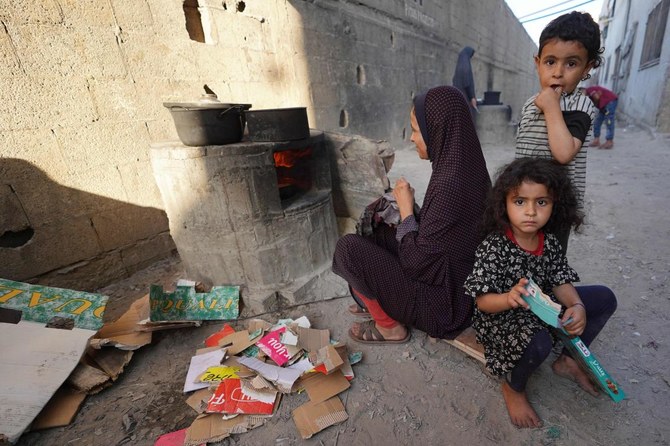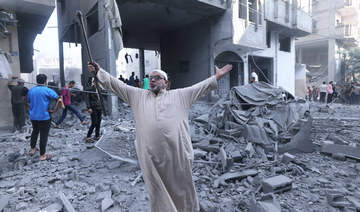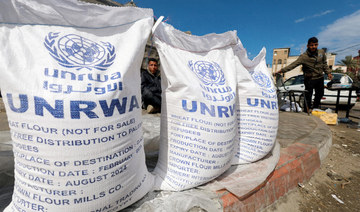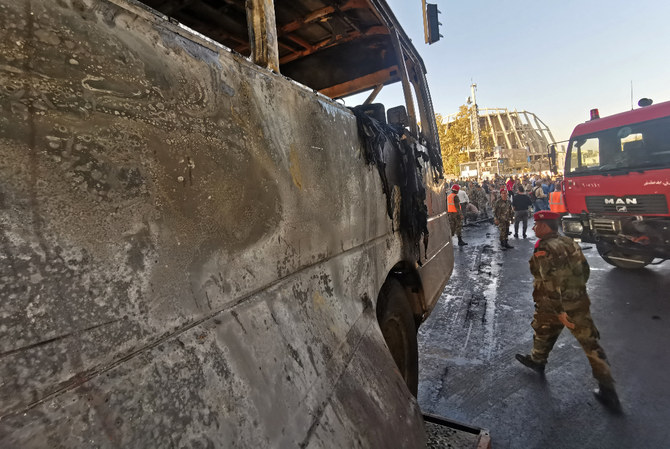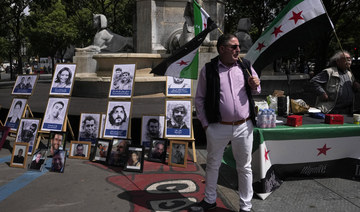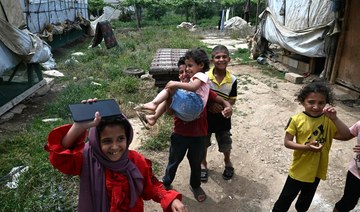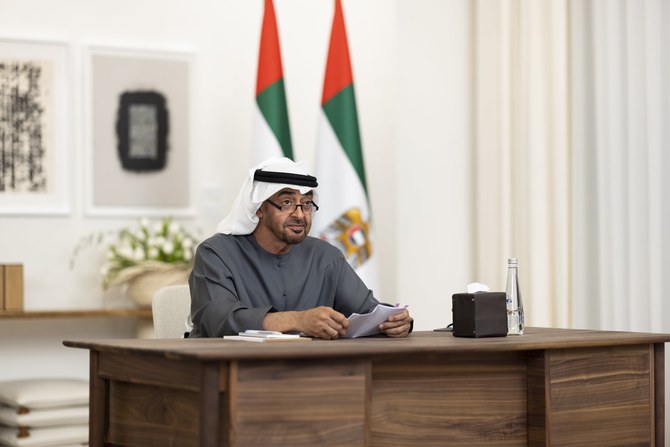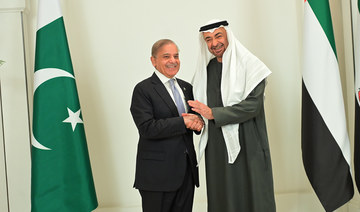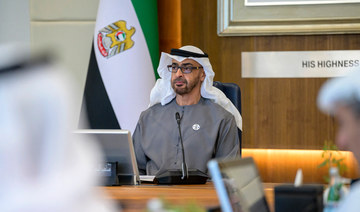TEL AVIV, Israel: Egypt said Friday it has agreed to send United Nations humanitarian aid trucks through Israel’s main crossing into Gaza, but it was unclear if they will be able to enter the territory as fighting raged in the southern city of Rafah amid Israel’s escalating offensive there.
Gaza’s humanitarian crisis has spiraled as the UN and other aid agencies say the entry of food and other supplies to them has plunged dramatically since Israel’s Rafah offensive began more than two weeks ago. On Friday, the top UN court — the International Court of Justice — ordered Israel to halt the Rafah offensive, though Israel is unlikely to comply.
At the heart of the problem lie the two main crossings through which around 300 trucks of aid a day had been flowing into Gaza before the offensive began.
Israeli troops seized the Rafah crossing into Egypt, which has been inoperative since. The nearby Kerem Shalom crossing between Israel and Gaza has remained open, and Israel says it has been sending hundreds of trucks a day into it. But while commercial trucks have successfully crossed, the UN says it cannot reach Kerem Shalom to pick up aid as it enters because fighting in the area makes it too dangerous.
As a result, the UN says it has received only 143 trucks from the crossing in the past 19 days. Hundreds of truckloads have been sitting on the Gaza side of the crossing unretrieved, according to Israeli officials, who say UN manpower limitations are to blame. UN and other aid agencies had to rely on the far smaller number of trucks entering daily from a single crossing in northern Gaza and via a US-built pier bringing supplies by sea.
Humanitarian groups are scrambling to get food to Palestinians as some 900,000 people flee Rafah, scattering across central and southern Gaza. Aid workers warn Gaza is near famine. UNRWA, the main UN agency in the humanitarian effort, had to halt food distribution in Rafah city because it had run out of supplies.
The Egyptian announcement appeared to resolve a political obstacle on one side of the border.
Israel says it has kept the Rafah crossing open and asked Egypt to coordinate with it on sending aid convoys through it. Egypt refused, fearing the Israeli hold will remain permanent, and demanded Palestinians be put back in charge of the facility. The White House has been pressing Egypt to resume the flow of trucks.
In a phone call with US President Joe Biden on Friday, Egyptian President Abdel Fattah El-Sisi agreed to allow trucks carrying humanitarian aid and fuel to go to the Kerem Shalom crossing until a solution is found for the Rafah crossing, El-Sisi’s office said in a statement.
But it remained unclear whether the UN will be able to access additional trucks coming from Egypt.
UNRWA did not immediately reply to requests for comment. In a post on social media outlet X on Thursday, it said, “We could resume (food distribution in Rafah) tomorrow if the crossing reopened & we were provided with safe routes.”
Mercy Corps, an aid group operating in Gaza, said in a statement Friday that the offensive had caused the “functional closure … of the two main lifelines” of aid and “has brought the humanitarian system to its knees.”
“If dramatic changes do not occur, including opening all border crossings to safely surge aid into these areas, we fear that a wave of secondary mortality will result, with people succumbing to the combination of hunger, lack of clean water and sanitation, and the spread of disease in areas where there is little medical care,” it said.
Fighting appeared to escalate in Rafah. Bombardment intensified Friday in eastern parts of the city, near Kerem Shalom, but shelling was also taking place in central, southern and western districts closer to the Rafah crossing, witnesses said.
Israeli leaders have said they must uproot Hamas fighters from Rafah to complete the destruction of the group after its Oct. 7 attack.
Hamas-led militants killed around 1,200 people, mainly civilians, and abducted around 250 others in the Oct. 7 attack. Around half of those hostages have since been freed, most in swaps for Palestinian prisoners held by Israel during a weeklong ceasefire in November.
Israel’s campaign of bombardment and offensives in Gaza has killed more than 35,800 Palestinians and wounded more than 80,200, the Gaza Health Ministry said Friday. Its count does not differentiate between civilians and combatants.
The Israeli military said its troops overnight found the bodies of three people killed in the Oct. 7 attack and subsequently taken into Gaza and counted among the hostages.
The bodies of Hanan Yablonka, Michel Nisenbaum, and Orion Hernandez Radoux were found in the Jabalia refugee camp in northern Gaza, where Israeli troops have been fighting for the past week with Hamas militants, the military said.
The announcement comes less than a week after the army said it found in the same area the bodies of three other Israeli hostages also killed on Oct. 7.
Nisenbaum, 59, was a Brazilian-Israeli from the southern city of Sderot. He was killed in his car as he went to get his 4-year-old granddaughter from a site near Gaza that came under attack by the militants.
Oryon Hernandez Radoux, 30, and Yablonka, 42, a father of two, were both killed as they tried to escape the Nova music festival, where the attackers killed hundreds of people. Hernandez Radoux had been attending the festival with his partner, German-Israeli Shani Louk, whose body was among those found by the army earlier.
Israel says around 100 hostages are still captive in Gaza, along with the bodies of at least 39 more, while 17 bodies of hostages have been recovered.
The group representing the families of the hostages said the bodies had been returned to their families for burial. Israeli Prime Minister Benjamin Netanyahu said the country had a duty to do everything to return those abducted, both those killed and those who are alive.
French President Emmanuel Macron gave condolences to the family of Hernández-Radoux, a French-Mexican citizen, saying France remains committed to releasing the hostages.
CIA Director Bill Burns was meeting in Paris on Friday with Israeli and Qatari officials in informal talks aimed at getting hostage and ceasefire negotiations back on track, a US official said, speaking on condition of anonymity to discuss the sensitive discussions. Burns is in close contact with Egyptian officials, who like the Qataris have acted as mediators with Hamas, the US official said.
Ceasefire talks ground to a halt at the beginning of the month after a major push by the US and other mediators to secure a deal, in hopes of averting a planned Israeli invasion of the southern city of Rafah. The talks were stymied by a central sticking point: Hamas demands guarantees that the war will end and Israeli troops will withdraw from Gaza completely in return for a release of all the hostages, a demand Israel rejects.



